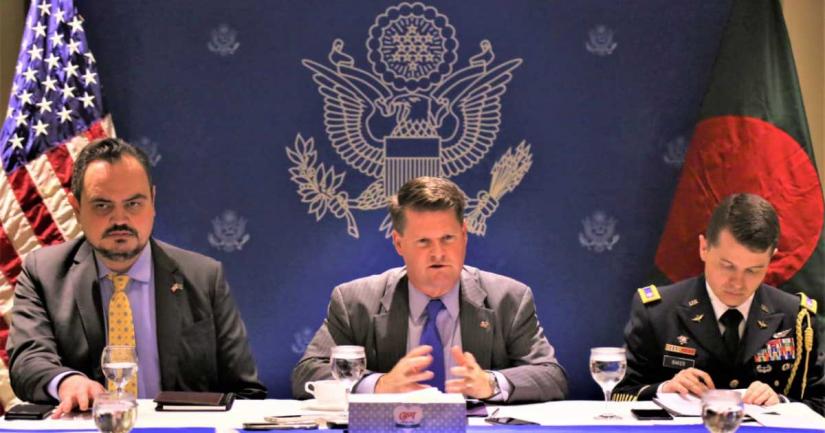 Washington is sending a strong signal to Dhaka to improve security ties by dispatching a senior defence official after a decade.
Washington is sending a strong signal to Dhaka to improve security ties by dispatching a senior defence official after a decade.
“I think also it is the first visit at this level from the Department of Defense quite some time, maybe a decade. I think that is some statement about our positive feeling about this relationship,” Assistant Secretary of Defense for Indo-Pacific Security Affairs Randall G Schriver told the media in Dhaka on Wednesday (Dec 4).
Schriver arrived Bangladesh the previous day and had a series of meetings with senior government officials where he discussed maritime security, humanitarian assistance, support to peacekeeping operations, counterterrorism, and defence professionalisation.
Schriver said he had meetings with PM's Security Affairs Adviser Tarique Ahmed Siddique and International Affairs Adviser Gowher Rizvi, army chief Gen Aziz Ahmed, Principal Staff Officer Lt Gen Mahfuzur Rahman and chief of the Directorate General of Forces Intelligence (DGFI) Maj Gen Mohammad Saiful Abedin.
“We had positive meetings this week with senior government of Bangladesh officials on how to strengthen and expand our defence relationship and look forward to continuing that dialogue going forward,” he said.
POLITICAL RELATIONS
Describing political ties as the pillar of the overall relationship, Schriver said, “We think it is strong but we want to have stronger relationship. And it is driven by interest.”
His meetings in Dhaka discussed what are the requirements in counterterrorism, maritime security, or UN peacekeeping, according to the US Defense Department official.
“It is a requirement-driven relationship and process. I think from our discussion with Bangladesh side, they are more open to cooperation with the US,” he said.
From both sides, environments have improved and we are responsive to that opportunity, he added.
“The message is mutual interest and improving the relationship and I think anybody objects to that, a neighbour or another country in the region, then that should be an interest of concern for both sides. We have no issue [if] Bangladesh improves relationship with other countries and no one should object to us improving our relationship,” Schriver said.
INDO-PACIFIC STRATEGY
Schriver said he had an opportunity to discuss the Indo-Pacific Strategy and explained the vision, which is an inclusive one.
“In the past day and half I have seen a lot of alignment in Bangladesh’s views and our views, particularly our overarching goals in this relationship which is Bangladesh to be strong, secure, independent, prosperous,” he said.
He said the Strategy has several pillars that include economy, good governance and security but from the Department of Defense, it mostly focused on security.
He acknowledged that “We understand there is a narrative frankly put out by our competitor that it is a confrontational approach, asking countries to choose between the US and China.”
The Indo-Pacific Strategy is an affirmative and inclusive strategy that seeks to preserve the rules-based international order for the security, prosperity, and stability of all countries in the region, including China, he added.
PENDING DEFENCE DEALS
The visiting US Defense Department official said he talked about Acquisition and Cross-Service Agreement (ACSA) and General Security of Military Information Agreement (GSOMIA) to open up a new opportunity for closer cooperation, more sharing of information and sensitive technology.
“I think the attitude is positive and we are engaged in a discussion on both agreements.
“We want to do this in a correct way in terms of making sure we have mutual confidence and security arrangement, which both sides see benefit,” he said.
“But, I would say that sense of urgency relates to the fact that we want to do more, we want to advance the defence relationship,” he said adding, “Our urgency just comes from a desire to move this relationship forward and these are important steps.”
ROHINGYA CRISIS
Washington has very little defence engagement with Myanmar due to atrocities they have committed against Rohingya, said Schriver before adding: “We would want to use whatever we do have to put pressure and try to persuade Myanmar to change their behaviour and approach."


